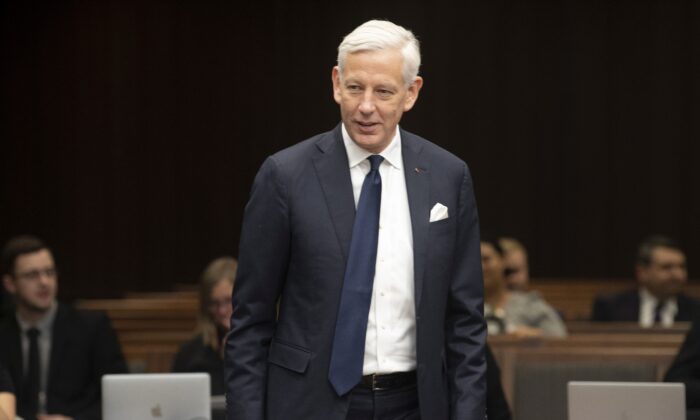
Commentary
If there’s anything for which members of Canada’s elite deserve any sort of distinction, it is their phenomenal inability to learn from experience and see reality as it is. In our relationship with China, this is displayed to a degree that’d be comical if it wasn’t so dangerous.
A poll done by Nanos following the dramatic release of Michael Kovrig and Michael Spavor concluded that 76 percent of Canadians want Chinese tech giant Huawei banned from participating in Canada’s 5G infrastructure. Regarding a free trade agreement, once the main focus of the Trudeau government’s foreign policy, 69 percent of Canadians think Ottawa should delay negotiations with Beijing due to the current state of affairs.
When it comes to China-related policies going forward, 56 percent support and 31 percent somewhat support joining with our democratic partners the United States, the United Kingdom, and Australia to contain Beijing. In addition, 43 percent said the release of the two Michaels notwithstanding, relations with the communist regime should not be friendly, while only 12 percent said it should be friendly.
Anyone who has been paying attention to the developments in Canadian public opinion toward China would see this as a new norm rather than a radical shift. ability of regular Canadians to grasp the complexity of foreign affairs shouldn’t be underestimated; they continually prove to be much more principled and attuned to the reality of global trends than those in a position to address these matters.
Recent utterances by Canada’s Ambassador to China Dominic Barton, a man tasked with advocating on behalf of our security and interests in Beijing, showcases truly how incapable our elite class is of ever analyzing the China problem outside the narrow confines of the economic bottom line.
During his remarks at a Sept. 28 meeting with members of the Canada China Business Council, Barton urged Canadian businesses to “seize opportunities where they exist and take advantage of the continuing economic rise of Asia and China.”
“Regardless of one’s outlook on it, China really can’t be ignored,” he said. “Where trade is concerned, our companies need to engage in support of our economic interest while being true to our values.”
Consider this a tacit confirmation, despite any claims to the contrary, that the Trudeau government was never going to come up with a new, comprehensive China strategy, and that it perceived the two Michaels affair as only a temporary roadblock in the effort to rekindle a glorious economic relationship with China.
This approach renders the array of geopolitical and national security factors almost completely irrelevant even though they are inextricably linked. But Beijing understands and makes it known that these issues can’t be divorced from each other, and that gives it an edge over Canada. Every move it makes in all areas is focused on the broader ideological goal of “national rejuvenation.” Moves made in the areas of trade or investment have always served the purpose of establishing leverage over countries that can be taken advantage of in disputes on other issues.
One of the primary defences of the engagement policy is the need for Canada to have “strategic autonomy” from Washington when it comes to China. It’s an idea that also always curiously arrives at the conclusion that, on behalf of Canadian interests, we should uncritically embrace China and accommodate it on consequential issues. What those favouring this approach don’t seem to grasp is that in order to have the sort of relations for which Barton and the Trudeau government advocate, it means ceding Canada’s foreign policy decisions to the whims of the Chinese Communist Party’s unpredictable temper tantrums. If this accomplishes anything, it is not “strategic autonomy.”
Which is why, for example, we continually fail to take any concrete stance on issues as crucial and simple as supporting Taiwan’s membership over that of China in the Trans-Pacific trade agreement. This is despite the fact that China’s membership would of course defeat the entire purpose of the trade deal, which is to participate with our Pacific partners in constructing a bulwark against Beijing’s influence.
China’s Ambassador to Canada Cong Peiwu wrote in a recent article: “re is a global reset going on, with shifting priorities, new relationships, and great opportunities. And while many have decried China’s economic development as a threat, I would rather present it to all Canadians for what I truly believe it is, the strengthening of an important relationship.”
Canada’s elites appear to agree, despite everything that has transpired that should make any rational person wince at the prospect of closer ties with China. With their blinkers remaining firmly in place, “business as usual” seems to be what they’ve chosen in the aftermath of the two Michaels debacle. Our security and international standing will continually suffer for it.
Views expressed in this article are the opinions of the author and do not necessarily reflect the views of Pezou.
Pezou : Did Canada’s Elites Learn Nothing From the Two Michaels Fiasco?